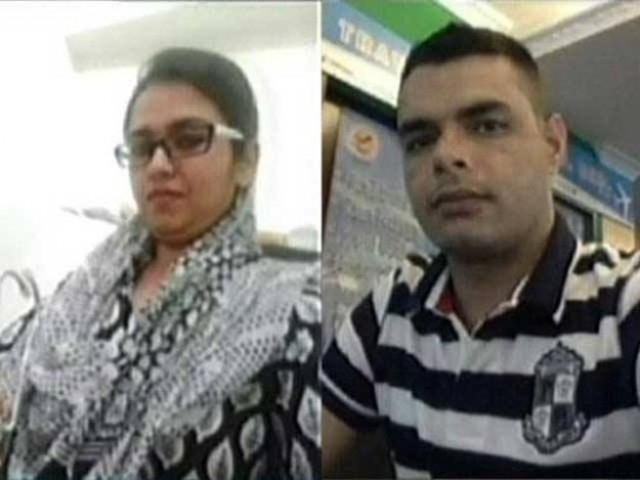Husband claims Indian wife knew about his first marriage
Tahir Ali claims she was pressured to give false statement before magistrate

SCREEN GRAB
In the latest twist, Ali has sought the Islamabad High Court’s intervention to meet his wife in ‘free atmosphere’ claiming Uzma recorded her statement before a magistrate against him under “duress and pressure” by her brother through the officials of the Indian High Commission in Pakistan.
On May 3, Uzma informed the magistrate that she was deceived, tortured and forced to sign marriage documents at gunpoint. Uzma said she had taken refuge at the high commission because she felt threatened and wanted to go back to New Delhi.
Contrary to her claim, Ali through his counsel Fayaz Ahmed claims that she is being forcibly kept there.
Indian woman claims she was duped, forced to marry Pakistani at gunpoint
“The alleged statement given in court along with the complainant allegedly filed in the court is the result of constant pressure and duress developed by the officials of the High Commission of India at the behest of her brother...Waseem,” he stated in the petition.
The husband alleged that his wife has been illegally and unlawfully detained at the Indian High Commission and his right to meet her has been violated.
Ali, a resident of Daggar Tehsil in Buner District, made the federation through the interior secretary, the foreign secretary, the high commission of India through the Indian high commissioner, and Uzma respondents.
While talking to the media at the IHC, Ali said that his first wife was aware of his second marriage and Uzma also knew about his first marriage.
He claimed that he has Whatsapp messages where Uzma asked him not to disclose details of his first marriage and also to exaggerate details of his educational qualification when her brother asks.
In the petition, Ali said that he is a taxi driver in Malaysia. In 2016, he met Uzma and their relationship further developed into an agreement that they should tie the knot. The counsel said that Uzma had asked the petitioner to come to India but he refused and instead asked her to come to Pakistan so that they could get married.
Later, he said, she willingly travelled to Pakistan on a valid visa issued by the Pakistani High Commission in India. On May 1, he said, she arrived at the Wagah border, where the petitioner received her and took her to his hometown.
After a day’s rest, Ahmed said, he went with Uzma to the district court in Daggar to get married, adding that Nikkah Registrar Hamayun Khan, who is also the nazim of the village, performed the nikkah.
All the process took place with the consent and willingness of Uzma, he said, adding that marriage documents were also signed by the couple and witnesses.
He revealed that Uzma’s brother later called her and spoke with the petitioner as well. Waseem asked the petitioner to approach the Indian High Commission in Islamabad to obtain a visa as Uzma's family wanted to host a reception in New Dehli.
On May 5, Uzma, the petitioner, and his maternal uncle came to Islamabad to apply for a visa.
Initially, he said, petitioner and others were asked to wait, but later the officials at the Indian High Commission called Uzma inside, and since, then the petitioner has not seen her.
The counsel said that the petitioner was denied entry to the Indian High Commission and has been unable to communicate with her in any manner whatsoever.
The petitioner alleged that Indian High Commission officials took his wife to a court, where she filed a complaint and recorded her statement under duress.
The petitioner said that he is Uzma’s husband and under the law can meet her in a free atmosphere. Barring him from meeting her is illegal and without lawful authority.
He has prayed the court to declare that he and his wife are legally husband and wife, having all rights and duties toward each other, and cannot be denied access to each other on any pretext.
Consequently, he said, the respondents should be directed to allow the petitioner to meet Uzma.



1724319076-0/Untitled-design-(5)1724319076-0-208x130.webp)















COMMENTS
Comments are moderated and generally will be posted if they are on-topic and not abusive.
For more information, please see our Comments FAQ